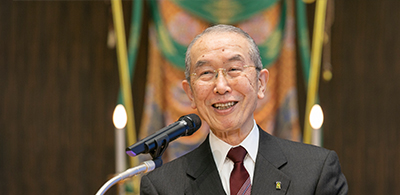Appreciating Seasonal Events
March 2015

Occasions That Stimulate Our Lives
In early spring, March events and celebrations are on many minds. These include the popular Doll Festival, school graduation ceremonies, Buddhist memorial services performed during the week of the spring equinox, the spring equinox itself, and at Rissho Kosei-kai, celebrating the anniversary of our founding on March 5.
When I think about how many people spend the national holiday marking the spring equinox, however, it seems to be simply another holiday that they spend no differently from any other day off. Although the purpose of the spring equinox holiday is to celebrate nature and appreciate living things, I come across very few people who spend the day pondering this and acting accordingly.
I feel that such people are almost wasting the day.
Throughout our daily lives, we often quote the old saying that “time and tide wait for no man,” since everything changes from moment to moment. If we look around us even a little, we see many changes taking place before our eyes. And yet, in most people’s experience, the previous day may have lacked any fresh new sensation, and so they are apt to pass through the present day feeling that their life is in a rut.
In such situations, I think it is seasonal celebrations and national holidays that can give us a chance to escape from that kind of rut and help spur us to lead our lives, by making us aware of what we may be thoughtlessly overlooking.
Knowing the meaning and origin of the spring equinox holiday, which I just mentioned, can help us appreciate our culture and traditions, and feel renewed pride in and love for them. Some people experience, welling up inside them, feeling the strength to go forward, spurred by the sense that spring has finally come and it is a time to give thanks to Nature and lead simple lives.
By pondering and experiencing such sensations, a humdrum day off can become a precious day leading to a deeper realization of life and greater spiritual growth.
Listening to the Voice of Life
Every country celebrates holidays that in some way mark the change of seasons and the anniversary of the nation’s founding. When I happened to be in the United States on Independence Day (July 4), I learned that there are always a variety of events and entertainment to celebrate the birth of that nation.
In Japan, we also celebrate the anniversary of the founding of the nation, of course, and appreciate the natural features of the seasons, such as viewing the cherry blossoms in spring and fireflies in summer, admiring the changing autumn leaves and enjoying the Tori-no-ichi, traditional fairs held in November at Otori shrines across Japan. In addition, we have age-old ways to enjoy the seasons and the holidays, such as writing poems about our encounters with such natural features and seasonal events.
Among the Japanese waka poems and haiku are ones that are familiar especially to Buddhists, which reflect the authors’ observation of impermanence through the visible working of nature, and the acceptance thereby of the way things really are. Here are a few examples.
“The color of the fields and the fragrance of spring, on the whole, / Sink into the hearts and minds of the people and become enlightenment” (by twelfth-century poet Saigyo). “They turn to show their backs, / They turn to show their fronts— / The scattering maple leaves” (by Edo-period Zen monk Ryokan). And then there is Zen master Dogen: “In spring, the flowers. / In summer, the cuckoo. / In autumn, the moon. / And in winter, the glistening snow.” These poems demonstrate, in a straightforward manner, the beauty of nature and the way things really are in our world.
Reading poems like these, I understand that seasonal events and the natural features of each of the four seasons all show us how life works, conjoining human beings and nature. In other words, we enjoy seasonal events and appreciate nature because in doing so we experience and cherish the vividness of life. This also means hearing the voices of the gods and the buddhas preaching through these natural features and events.
Speaking of spring, there is a well-known Chinese poem that begins with the lines, “In spring, one sleeps unaware of dawn, with birds chirping everywhere.” I think many people share that feeling.
According to the theory of the Five Elements of China, spring is associated with youth. We could say that if youth begins in March according to this theory, our organization, which was founded in March, demonstrates its true potential only when it is full of the energy of youth. Of course, for people, too, no matter what age, at any time and in any moment they can be at the youngest point in their lives, and therefore it is true for everyone that now is the springtime of the rest of their lives.
With such determination, let us continue to practice diligence, ever mindful of the wish to bring happiness to as many people as possible, keeping the spirit with which our organization was founded.
Back Number



